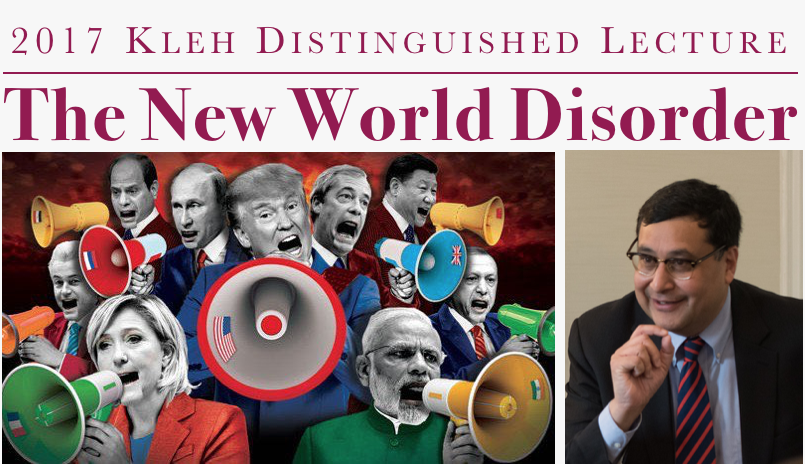Najam Delivers 2017 Kleh Distinguished Lecture
Adil Najam, Dean of the Frederick S. Pardee School of Global Studies at Boston University, delivered the 2017 Kleh Family Foundation Distinguished Lecture on “The New World Disorder: The Politics of Anti-Politics,” on November 1, 2017, at the Boston University London Center.
Held annually since 2001 in London, United Kingdom, this prestigious lecture series is made possible by the generosity of BU alum William Kleh, his wife Patty Kleh and the Kleh Family Foundation. The Kleh Distinguished Lecture brings some of the best and most innovative minds from the BU faculty to London to speak to BU’s London-based alumni and guests. Past speakers who have been invited to deliver the Kleh Lecture have included Prof. Kevin Outterson (BU Law School), Prof. Vivien Schmidt (BU Pardee School), Prof. Edward Damiano (BU College of Engineering), President Robert Brown, Dean Tom Fiedler (BU College of Communication), Prof. Andre de Quadros (BU College of Fine Arts), Prof. Andrew Bacevich (BU Pardee School), and Prof. Elie Wiesel (BU College of Arts and Sciences), amongst others.
You can listen to the entirety of Najam’s lecture here (lecture begins at 17:30):
This year’s lecture was attended by Bill Kleh and the Kleh family, and Dean Adil Najam was introduced by the BU Provost and Chief Academic Officer, Prof. Jean Morrison. It was attended by a large number of BU’s London-based alumni and guests.
The lecture was based on Najam’s essay of the same title, published earlier this year. Using evidence from current political trends and developments, Najam presented the argument that the rise of Donald Trump in the United States, Brexit in the United Kingdom, ultra-nationalism in India, and strongman politics in Russia and China are best understood in the context of a much larger global trend – or a New World Disorder – which was exemplified by what he called the ‘politics of anti-politics.’ He argued that the so-called ‘post-truth’ politics is also a global phenomenon and has been aided by technologies, especially social media, that foster “communitarian echo chambers.”
Najam suggested that there is a global public “demand” for strongman leaders and not just politicians but the very idea of politics has come under universal attack. Much of this, according to Najam, reflects the failures of governance by politicians themselves. The result, however, is that “today about half the world’s population, two-thirds the world economy, and three-fourths the world military is being ruled by strongmen.”
The lecture was followed by a lively question-and-answer session with the audience.
Adil Najam is the inaugural dean of the Frederick S. Pardee School of Global Studies at Boston University and professor of International Relations and Earth & Environment. Earlier, he served as vice chancellor of Lahore University of Management Sciences (LUMS), in Lahore, Pakistan, and as the director of BU’s Frederick S. Pardee Center for the Study of the Longer-Range Future. He has also taught at MIT and at the Tufts University Fletcher School of Law and Diplomacy. His research focuses on issues of global governance and global public policy, including those related to diplomacy, climate change, South Asia, Muslim countries, and human development.
